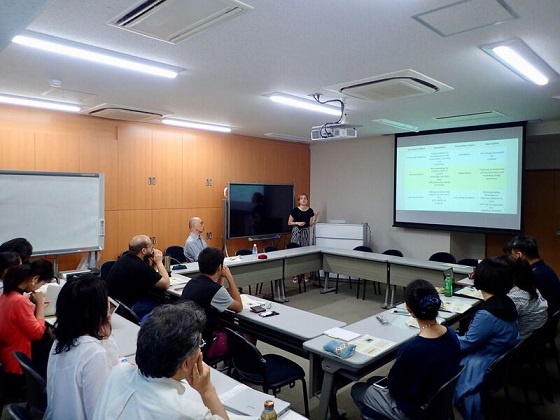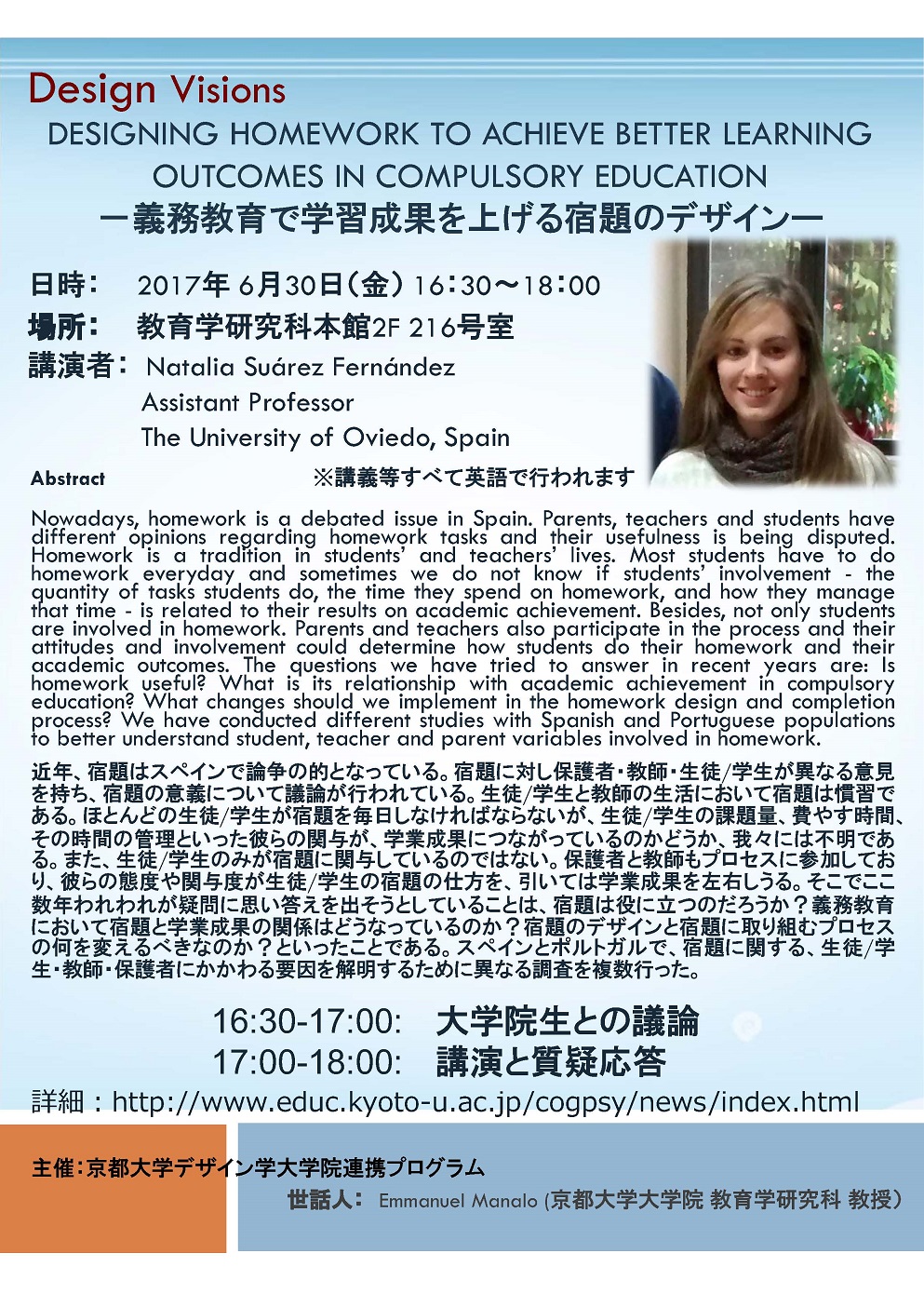"Designing Homework to Achieve Better Learning Outcomes in Compulsory Education"
-義務教育で学習成果を上げる宿題のデザインー
講師:Natalia Suárez Fernández (Assistant Professor, The University of Oviedo, Spain)
日時:2017年6月30日(金)16:30~18:00
場所:教育学研究科本館 2階 216号室
教育学研究科のアクセス
プログラム:
16:30-17:00:大学院生との議論
17:00-18:00:講演と質疑応答
※講義等すべて英語で行われます。
世話人:Emmanuel Manalo(京都大学大学院 教育学研究科・教授)
主催:京都大学デザイン学大学院連携プログラム
問合わせ先:manalo.emmanuel.3z[at]kyoto-u.ac.jp([at]を@に変えてください)
Emmanuel Manalo(京都大学大学院 教育学研究科・教授)
リンク:教育学専攻 教育認知心理学講座
概要:
Nowadays, homework is a debated issue in Spain. Parents, teachers and students have different opinions regarding homework tasks and their usefulness is being disputed. Homework is a tradition in students’ and teachers’ lives. Most students have to do homework everyday and sometimes we do not know if students’ involvement – the quantity of tasks students do, the time they spend on homework, and how they manage that time – is related to their results on academic achievement. Besides, not only students are involved in homework. Parents and teachers also participate in the process and their attitudes and involvement could determine how students do their homework and their academic outcomes. The questions we have tried to answer in recent years are: Is homework useful? What is its relationship with academic achievement in compulsory education? What changes should we implement in the homework design and completion process? We have conducted different studies with Spanish and Portuguese populations to better understand student, teacher and parent variables involved in homework.
近年、宿題はスペインで論争の的となっている。宿題に対し保護者・教師・生徒/学生が異なる意見を持ち、宿題の意義について議論が行われている。生徒/学生と教師の生活において宿題は慣習である。ほとんどの生徒/学生が宿題を毎日しなければならないが、生徒/学生の課題量、費やす時間、その時間の管理といった彼らの関与が、学業成果につながっているのかどうか、我々には不明である。また、生徒/学生のみが宿題に関与しているのではない。保護者と教師もプロセスに参加しており、彼らの態度や関与度が生徒/学生の宿題の仕方を、引いては学業成果を左右しうる。そこでここ数年われわれが疑問に思い答えを出そうとしていることは、宿題は役に立つのだろうか?義務教育において宿題と学業成果の関係はどうなっているのか?宿題のデザインと宿題に取り組むプロセスの何を変えるべきなのか?といったことである。スペインとポルトガルで、宿題に関する、生徒/学生・教師・保護者にかかわる要因を解明するために異なる調査を複数行った。
Report:
 At the Graduate School of Education, on June 30, 2017, we invited Dr Natalia Suárez Fernández to give a lecture on her research findings about homework. Dr Suárez is an Asssitant Professor at the Department of Psychology of the University of Oviedo in Spain. For over 5 years, she has been working with a multinational research team on investigating various aspects of homework assignments and the promotion of self-regulated learning in compulsory education contexts. Based on some of their key research findings, the lecture she presented identified some crucial teacher- and parent-factors that could make homework more facilitative of academic achievement.
At the Graduate School of Education, on June 30, 2017, we invited Dr Natalia Suárez Fernández to give a lecture on her research findings about homework. Dr Suárez is an Asssitant Professor at the Department of Psychology of the University of Oviedo in Spain. For over 5 years, she has been working with a multinational research team on investigating various aspects of homework assignments and the promotion of self-regulated learning in compulsory education contexts. Based on some of their key research findings, the lecture she presented identified some crucial teacher- and parent-factors that could make homework more facilitative of academic achievement.
Dr Suárez lecture was held from 17:00-18:00. Prior to her lecture, however, she held an informal discussion session with graduate students (16:30-17:00), covering a wide range of issues including the similarities and differences in education systems in Spain, Japan, and a few other countries. The graduate students who participated in this session were also able to explain some of the reasons why they were interested in the topic of homework and in finding out more about Dr Suárez’ research findings.
Dr Suárez’ lecture went very well. The key conclusions she drew at the end were as follows:
• Doing homework is beneficial for academic achievement.
• Quality – rather than quantity – of time spent on homework is what matters.
• Time management of homework is one of the most important variables that link to academic achievement.
• Teachers must provide feedback if they assign homework.
• Parental involvement is beneficial depending on execution.
Dr Suárez discussed with the audience the practical implications of these conclusions.
An informal meeting was held after Dr Suarez’ lecture to explore connections between her research themes and those of some of the graduate students who attended the lecture. The aim of the informal meeting was to facilitate opportunities for graduate students to interact with an international researcher who has common/similar themes in research. Dr Suarez’ interest in homework and self-regulated learning overlaps with a number of students’ research interest – particularly those investigating various aspects of teaching and learning strategies. It is important for our graduate students to develop communication and interpersonal skills that would enable them to discuss their research in less formal contexts and to develop international networks and collaborations.
 フライヤー
フライヤー
京都大学 デザイン学大学院連携プログラムKyoto University PAGE TOP